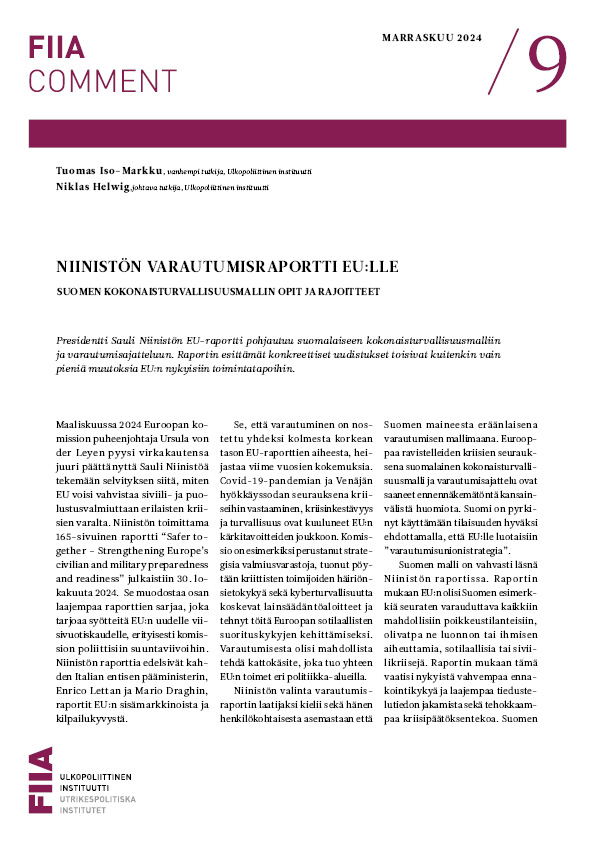The first round of parliamentary elections in October turned out to be symptomatic of a derailed democratic transition in Egypt. Mainly endorsing the return of authoritarian governance structures, they epitomise the regime’s resistance to the reform demands of the protestors.
The 2015 elections could have been considered a step in the right direction after the dissolution of Egypt’s first freely elected parliament in 2012. Aimed at re-introducing a missing element of the political sphere in Egypt, an elected house of representatives, the polls should help to end the extraordinary combined executive-legislative powers enjoyed by the presidency – thereby sealing the roadmap announced by then Minister of Defence and current President, Abdelfattah El-Sisi, in July 2013.
In practice, however, the new parliament will be neither representative of society at large, political parties or competing programmatic visions, nor capable of, let alone interested in, exercising its constitutional legislative role. On the contrary, the electoral alliance which won the first round of the elections, ‘For the love of Egypt’, had no qualms about announcing during the election campaign that it is considering strengthening the role of the presidency by scaling back the legislative power of the elected body.
This setting has left the majority of the population politically disillusioned, and despite efforts to mobilise voters with days off, televised appeals and even religious decrees, roughly 75% abstained.
The run-up to the elections was delayed by a conflict between the President and the Supreme Constitutional Court on legal questions. The main bone of contention concerned redrawing the electoral districts, but an agreement was reached on this. Other essential features of the polls are a marked increase in the number of seats (reaching 595) and the exclusion of the Muslim Brotherhood.
The outlawing of the main Islamist opposition, barring their participation on terrorism charges, only left room for political Salafism (the ‘Al-Nour’ Party) and the Brotherhood offspring ‘Strong Egypt’, the latter announcing their boycott a couple of days ahead of the polls.
In addition, a week-long, state-sponsored anti-Islamist pre-election campaign, ‘No to religious parties’, tried to delegitimise parties based on Islamic referential authority. Al-Nour, which lost credibility by siding with the military during the 2013 coup d’état, announced a voluntary reduction of its scope of activities by running only in a limited number of constituencies – most probably to avoid a foreseeable election fiasco.
The picture is no less bleak in the liberal and leftist opposition camp. The Destour Party, founded by Nobel peace prize laurate Mohammed El-Baradei in 2012, and the centrist party platform ‘Sahwet Misr’ (Egypt’s Awakening, which includes senior members of the anti-Mubarak Kifaya movement), eventually decided to boycott the elections. In the same vein, the ‘Egyptian Popular Current’, a party list under the former presidential candidate Hamdeen Sabahi, abstained from running in protest against the election procedures.
Despite a presidential pardon announcing the release of one hundred political prisoners in September, central opposition figures and political activists like Ahmed Maher or Alaa Abdelfattah remain incarcerated. Combined with President El-Sisi’s calls for a ‘unified political front’ and for the necessity to re-write the constitution in his favour, resulting in the forging of the loyalist list ‘For the Love of Egypt’ under the former General Sami Seif al-Yazal, this does not inspire much confidence in the democratic claims of the regime.
The first round of the elections (in 14 of 27 governorates, electing 273 seats) was identified in social media under the hashtag #no_one_went. Effectively, the voting was marked by the lowest turnout since the start of the upheaval: 26.56% in the first round, an even lower 21% in the run-off – topped by a marginal 14% turnout in the second biggest city, Alexandria, as well as an evanescent 3% of voters living abroad. ‘For the Love of Egypt’, the loyalist alliance, secured all 60 party seats available in the first round. A similar feat should be expected for the remaining 60 seats in the second round.
Another party loyal to the regime, the ‘Free Egyptians Party’, set up by businessman Naguib Sawiris, was able to secure a total of 41 seats. Roughly 50% of its candidates are former members of the National Democratic Party, the now disbanded, pre-revolutionary ruling single party. In contrast, al-Nour, the second strongest party in the previous parliament, now has to contend with a meagre 11 seats – compared to 22% in the last elections (then corresponding to 123 seats).
Emerging from this first round are electoral procedures devoid of pluralism, deliberation or competing visions. The loyalist camp, local notables and those not intimidated out of the process will form the mainstay of the next parliament. Anticipation of these results fully explains historically low voter participation.
Yet, the new house of representatives in Cairo will be measured by nothing more than its deeds. The first constitutional task is the review of presidential decrees issued by Abdelfattah El-Sisi and the interim President of 2013–2014, Adly Mansour. But nominal parliamentary powers will enter in stark contrast to a presidential system under military tutelage.
Rather, it should be expected that the constitution will be amended in order to strengthen the presidency. And the technocratic government, set up as recently as September by presidential decree, could be re-approved. In the medium-term, however, the semblance of stability created by the polls cannot be maintained by excluding a substantial part of the political community. Regime intransigence, as expressed in the election procedures, runs the risk, in the worst case, of preparing the ground for a civil war scenario.









